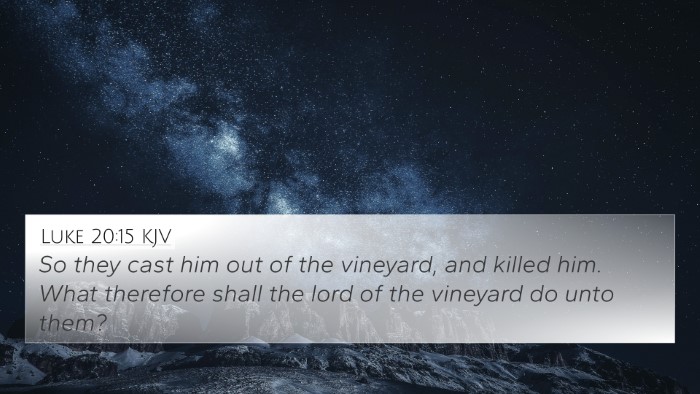Understanding Mark 12:8
Bible Verse: Mark 12:8 - "And they took him, and killed him, and cast him out of the vineyard."
Summary and Interpretation
This verse is a part of Jesus’ parable of the wicked tenants, reflecting the rejection and mistreatment of God’s messengers throughout biblical history. In this particular verse, the killing of the son represents the ultimate rejection of Jesus by the religious leaders of the time.
Insights from Public Domain Commentaries
- Matthew Henry: Emphasizes the evil nature of the tenants who, out of greed and rebellion, sought to take the inheritance for themselves. This symbolizes how Israel rejected the prophets and ultimately Jesus, who was sent from God.
- Albert Barnes: Notes that this act of murder illustrates the extent of human depravity in rebelling against God's authority. The casting out of the son from the vineyard symbolizes Christ’s crucifixion outside the city, highlighting the shame of His rejection.
- Adam Clarke: Points out the historical context where God had sent prophets to Israel, only to have them mistreated and killed. This verse serves as a solemn reminder of the consequences of rejecting divine authority and grace.
Thematic Connections
Mark 12:8 connects deeply with various themes in the Bible:
- Rejection of Prophets: Echoed in Matthew 23:37, where Jesus laments over Jerusalem for killing the prophets.
- The Cost of Disobedience: Referenced in Hebrews 10:28-29, which warns of the seriousness of rejecting God's salvation.
- God’s Judgment: **Isaiah 5:1-7**, which uses the metaphor of a vineyard to describe Israel’s failure to produce good fruit.
Related Bible Cross References
Here are key Bible verses that relate to Mark 12:8:
- Matthew 21:33-46: The Parable of the Wicked Tenants; parallels the same theme of rejection and judgment.
- Luke 20:9-16: Also recounts the parable with the same moral implications on Israel.
- 1 Peter 2:4: Jesus as the living stone rejected by men.
- Hebrews 11:36-37: A reminder of the suffering and rejection faced by God’s messengers.
- Luke 7:30: Pharisees and lawyers rejected God’s will for themselves.
- Acts 7:52: Stephen refers to the treatment of prophets highlighting Israel’s history of rejection.
- John 1:11: "He came to His own, and His own did not receive Him," emphasizing the same rejection theme.
Tools for Cross-Referencing
Understanding biblical texts can be enhanced through various methods and resources:
- Bible Concordance: A tool for locating verses related to specific words or phrases.
- Bible Cross-Reference Guide: Helps in finding connections among different scriptures.
- How to Use Bible Cross-References: A methodical approach to studying themes and verses that correlate with each other.
Application and Reflection
This verse challenges believers to reflect on their response to God's messages and messengers. Are we receptive or do we ignore the warnings? The fate of the tenants serves as a cautionary tale about the consequences of rebellion against God’s will.






